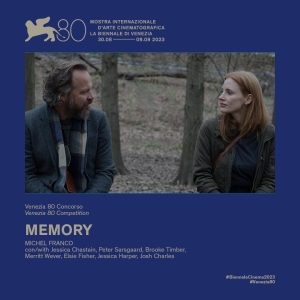As someone unfamiliar with Michel Franco’s filmography – despite knowing how successful the filmmaker was with New Order – I didn’t quite know what to expect from Memory. What truly lured me into watching this movie were the phenomenal performances promised by Jessica Chastain (The Good Nurse) and Peter Sarsgaard (The Batman), amidst the awards buzz that surrounded them. I’m pleased to state that what unfolded on screen was an intricate study of the human experience, exploring the fragility and resilience of memories, all wrapped in a muffled color palette and without background music.
Memory Critique

Also Read: Wonka Review – A Whimsical World of Pure Imagination
Memory tells the story of Sylvia (Chastain), a social worker who leads a simple, structured life. That is until she encounters Saul (Sarsgaard), a stranger who follows her home from their high school reunion. I won’t go into much more detail than this because I genuinely believe going into this film blind is the best possible viewing experience you will get. Franco fills his movie with shocking revelations about his characters that I believe carry much more impact if the audience is unaware of them beforehand.
At the heart of Memory lies a profound exploration of the significance of memories in shaping our identities. Franco poses a poignant question: without memories, who are we? The writer-director’s finesse is evident in his ability to navigate the complexities of this theme with subtlety and nuance that are rarely seen in contemporary cinema. The narrative unflinchingly dives deep into heavy subject matters often shied away from mainstream stories. From the haunting specter of dementia to the searing trauma of sexual abuse, familial distrust, and the corrosive effects of alcoholism, Memory fearlessly confronts the darker corners of life. These aren’t mere plot points, but threads written into the fabric of the characters’ lives, molding their identities in impactful ways.
What sets Franco’s approach apart is the authentic, sincere care with which the filmmaker handles these sensitive topics. There’s a mindful effort to avoid the pitfalls of exploitation, presenting these themes not as sensationalized narratives but as genuine reflections of the struggles that define the human experience. Memory depicts empathy and understanding with a meticulous touch, allowing the audience to confront uncomfortable truths without feeling manipulated.
From a technical standpoint, Memory‘s audiovisual choices contribute significantly to its narrative impact. The muted color palette, the absence of a traditional score, the use of static camera work and long takes, the performance-driven focus… the overall deliberate lack of technical embellishments create an atmosphere that fits the thematic richness. These decisions serve to enhance the emotional weight of the narrative, drawing the audience deeper into the complex world of the characters.

The ensemble cast represents a fascinating collection of morally grey characters, each flawed and burdened by past mistakes or traumas. Memory‘s biggest strength lies in its thorough character development, packed with twists and revelations that completely change the first perception viewers have of these very real people. Love, in all its forms, is yet another important theme in the film. Franco analyzes the depth of human connection and the lengths to which individuals are willing to go for love, as it has the power to transcend barriers, even when people are fully aware that their relationships may lead to intense suffering. Memory presents a raw, unfiltered portrayal of love that defies societal norms and expectations, showcasing its enduring power.
Finally, Chastain and Sarsgaard are nothing short of impressive. Their portrayals are marked by fearless dedication and an unwavering commitment to their roles. Both deliver incredibly compelling, emotionally charged displays that elevate the movie, creating a dynamic on-screen chemistry that made the runtime fly by without me noticing. I really don’t have any major issues with Memory, besides brief moments of unnecessary melodrama and a bit of padding to make the film slightly longer. A must-watch!
In Conclusion
Memory is a poignant exploration of identity and relationships, anchored by mesmerizing performances from Jessica Chastain and Peter Sarsgaard. Michel Franco delves into the profound significance of memories, tackling heavy themes such as dementia, sexual abuse, familial distrust, and trauma with authentic, non-exploitative care. The deliberately subtle technical choices, such as a colorless palette and the absence of a musical score, heighten the sensitive weight of the impactful atmosphere. Packed with fascinating, morally complex characters, the movie stands as a testament to the transformative potential of cinema in studying the depths of the human experience.
8/10

Follow us for more entertainment coverage on Facebook, Twitter, Instagram, and YouTube.



